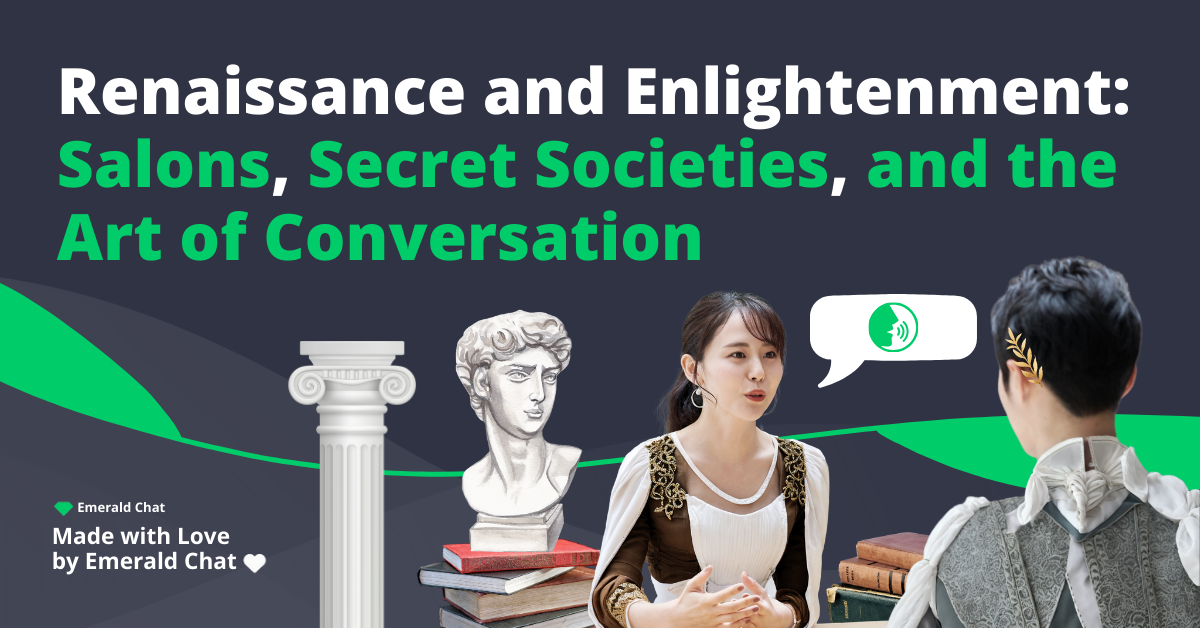Imagine a world where brilliant minds gather in elegant drawing rooms, debating philosophy and art. Or perhaps they meet in shadowy corners, whispering coded messages and plotting political revolution.
This thrilling reality of societal transformation through discussion was the driving force behind the rise of intellectual gatherings during the Renaissance and Enlightenment.
The world of salons and secret societies formed a vibrant backdrop for the transformative power of conversation. But what forms did these intellectual gatherings take, and how did they wield such influence?
1. The Birth of the Salon
Picture the scene: a lavish Parisian apartment adorned with fine art and overflowing bookshelves. In these intimate salons, the currency isn’t gold coins, but wit. Charismatic hostesses, often women denied power in traditional spheres, preside over these intellectual battlegrounds where a sharp mind can rewrite your social standing.
Philosophers with ink-stained fingers debate alongside artists yearning to capture the human spirit. Statesmen hungry for respect jostle with writers whose words promise to rewrite the rules of society. Here, a cleverly crafted question or a poetic rebuttal can make your reputation soar overnight.
These salons aren’t just a showcase for dry theories. Passion fuels these debates. Eyes gleam with fervent agreement or flash with righteous anger. This isn’t just about thinking, it’s about feeling your way towards a world waiting to be reshaped.
2. Societies Cloaked in Secrecy
But while the salons hum with the energy of open discussion, other conversations unfurl in the shadows. Secret societies, some with radical agendas, gather in hushed meeting rooms and whispered exchanges. These aren’t idle thinkers – they yearn to dismantle the old order.
Imagine the thrill and terror felt by a new member initiated into a shadowy brotherhood. Coded handshakes, cryptic symbols, and clandestine texts bind them together far more potently than any formal oath. The shared desire for change electrifies the air, creating a unity of purpose far deeper than social pleasantries.
3. Customs: Codes, Coalitions, and Individuality
The Renaissance and Enlightenment introduce a heady new concept: individual choice. Suddenly, who you are matters just as much as who you were born to. This ripples through society, even within the strict confines of courtship and desire.
Life during this era was full of intriguing customs. Ideas had to be shared carefully, so coded messages and symbolism thrived. People searched for others who understood their passions, forming groups bound by niche interests—a concept that feels surprisingly familiar in today’s online communities.
4. Intimacy in an Era of Conversation
Discussions weren’t just about dry theories, these were passionate exchanges that could spark attraction. Flirting often disguised itself within intelligent wordplay. While physical intimacy was still heavily influenced by strict social rules, the intellectual connection between individuals became more valued.
The Emerald Tie-In
Today, we might not meet for philosophical debates in a countess’s parlor, but the spirit of connection lives on. The internet allows us to seek out niche interest groups in minutes. Just like the secret societies and intellectual salons of the Renaissance and Enlightenment, these online spaces are built on shared passions, a sense of belonging, and the desire to connect on a deeper level.
History Repeats Itself
Whether it was in a glittering salon of the 17th century or a modern-day online forum, the desire for intellectual exchange and connection is a timeless human trait. The Renaissance and Enlightenment remind us that conversations are not just words exchanged—they can reshape the world.
Key Takeaways
- Conversations shape history: Whether in a glittering salon or a hidden meeting place, the debates and ideas exchanged during the Renaissance and Enlightenment shifted the course of history.
- Secrets foster connection: Shared passions and the need for secrecy created powerful bonds within societies and intimate relationships.
- Individuality takes center stage: This era saw a growing emphasis on personal choice when seeking intellectual connection and community. The search for like-minded individuals is a concept we recognize even in online communities today.
Next time…
We will dive into “Industrial Age: Telegraphs, Trains, and the New Tempo of Love.”
This Industrial Revolution changed everything, including how people fell in love. With telegraphs shortening distances and trains allowing for greater travel, will relationships find more freedom? Or will society tighten control in response to rapid change? Stay tuned to find out!


Leave a Reply